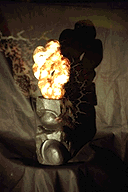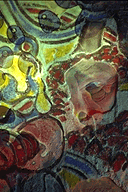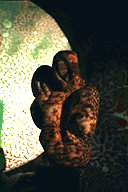...The reality, unfortunately, is that most people are just struggling to do what they can for themselves and their families within the existing structures. If, in the mid-1990's, we go out into our workplaces, neighborhoods, or cities to inquire, the majority of the people that we randomly encounter will not be
enthusiastic about personally taking action to change the government, let alone to change the principles by which the whole world is governed. At best they may smile and say, "Somebody should do it, but I don't have time!"
...The socio-economic forces that support the status quo, combined with the inertia in our daily lives, are seldom overcome on the basis of a constructive new social invention. Generally, only a major crisis can stimulate people to act in sufficiently large numbers to change the deep structures of society. In the midst of converging future crises that impinge powerfully on our personal lives, people will undoubtedly start to move. As the problems of the 21st century begin to intrude dramatically into our children's lives, it will be even more obvious to their generation that changes must be made. At that time more individuals - both young and old - will feel themselves motivated and responsible for making those changes.
There are a brave few, however, a happy few who already believe in the possibility of creating a real, sustainable world that more closely matches their dreams. They are the people who will seed the next world. They will create the next frame of position and direction into which large numbers will eventually begin to move. These few are the best hope, I believe, of all future generations of life on Earth. Their pioneering advances now will keep alive the possibility that some of our great grandchildren will carry the torch of life far beyond our planetary shores...
- Will Foreman, Creative Democracy and the Internet,
Pensema Publishing, 1996
- Will Foreman, Creating Democracy In Time: A Strategy for Human Survival in the 21st Century,
Pensema Publishing, 1994
...And when,
in this beginning,
I am
without a body
will you place an ear
close upon some river's course
that I may hear the mystery
of Life's whispering source?
Or dig your hands deep inside the Earth
that I may feel
the substance of my birth?
And when,
in this beginning,
I am an infant mind
will you know, for me,
that Earth's Elysian Whole
is reaching out to all its Parts,
the mountains, fields, and brooks
that murmur deep within our hearts?
That oceans sing an Epic Song
that sweeps around the rugged shoals
and hugs the shore
where hearts belong?
And will You fight
through tears
to find your Other
in that salty old refrain
and learn
how much discord human love can dare contain?
And when at last we dare
to search for answers
down every inner lane:
Will I have a heart and soul?
Can a city think a thought?
Feel any part?
Become a living whole?
- Will Foreman, Lost In Dreams
Pensema Publishing, 1996
...What we call "democracy" today is actually, in most cases, a very limited manifestation of the idea of democracy. If our democracies provided "equal protection before the law," an idea which along with "freedom," has been central to the development of democracy since its origins, we would expect the rich and poor to have equal representation in the courts and in our law-making legislatures. With equality before the law we would expect that
unfair advantages in economic exchange would have been substantially reduced, and that consequently, the gap between the richest and poorest would be more narrow - with ownership of large corporations more equally shared.
In the United States, we would also expect elected representation - in proportion to their numbers - of women, Native Americans, African-Americans, Asian-Americans, European-Americans, and Hispanic Americans. We would think it natural that infant mortality rates, employment rates, educational levels, life expectancy, and access to housing, food, and health care be essentially identical for all population groups. We would not let millions of people become homeless, wandering in the streets seeking food and shelter. We would certainly require that powerful determinants of public policy-making, such as the mass media, be owned and controlled on the basis of a balance among competing public interests - and not by special interest, private profit monopolies. We would not have politicians "selling" their votes, "secret government" by self-selected groups within government, or authoritarian bureaucracies and regulatory bodies that remain indifferent to the needs of real people and of the environment. Without the special interests in modern democracies slowing our social reaction times, our democratic systems would have responded a long time ago to the increasing problems of pollution, ozone depletion, the nuclear arms race, overpopulation, mass starvation, and the grossly unequal distribution of health care and material wealth... p. 45
- Will Foreman, Creating Democracy In Time: A Strategy for Human Survival in the 21st Century,
Pensema Publishing, 1994
From the book Creating Democracy In Time:
...Human systems have a profound impact on virtually the whole biosphere. In the future, if democratic systems survive and prosper, humans will have the ability to transport themselves and other life forms to extraterrestrial locations--and then to transform the environments there. Democracy, therefore, has a special meaning in relation to the evolution of all living systems.
Because arguments about democracy are likely to grow more clamorous during the crises of the next half century, we will need to develop a more thorough understanding of both the historical role and the larger meaning of democracy.
The advocates of democracy will have to contend with vociferous, deceptive, and determined opponents. Like radio static left over from the "big bang," anti-democratic noise has been present from the beginning. In the case of democracy, however, the ruckus gets louder from time to time. Those who believe in democracy's potential would do well to strengthen their arguments now in support of democracy. Utilitarian approaches based on efficacy - or moral persuasion based on human values - will not be enough. Democracy, it would be nice to add, is also a better opening to the rest of the Universe, to a deeper understanding of the human spirit, or even to the "mind of God." p. 52
- Will Foreman, Creating Democracy In Time: A Strategy for Human Survival in the 21st Century,
Pensema Publishing, 1994
From the book Creating Democracy In Time:
...If we manage to organize a coherent, democratic response that enables us to survive the middle third of the next century with human rights and human self-respect intact, we will be ready to create and improve a sustainable world civilization that can begin a more extensive expansion of life into the heavens. Although some humans may inhabit small settlements on moons or other planets of the solar system in earlier steps toward interplanetary civilization, it is difficult to imagine any significant expansion of the biosphere to other worlds before a sustainable and unified democracy on Earth enables such conservation and concentration of material resources as will be needed to lift the human habitat toward the celestial horizons.
If this exploration and the further expansion of living systems out into the galaxy is to be accomplished with a minimum risk of "star wars" between opposing empires or federations, then it must be initiated and sustained as a carefully monitored extension of the democratic, social organism here on Earth. Advanced stages of democracy, unified to a degree perhaps difficult to imagine from the perspectives of our present cultures of self-interest and dogmatic divisiveness, will be necessary both to manage a intricate, delicately balanced, worldwide, human-centered ecosystem and to keep the new system of interplanetary settlements from collapsing into conflict and chaos.
As we reach out into the cosmos, opening ourselves to the infinite and the cosmos to an infinity within us, we may find no gods but those within ourselves. The task of religious leaders and scholars in the 21st century will be to help us preserve the best in our old religions, and to lead us in the reinvention of the gods within ourselves - gradually merging those godlike attributes that are best suited to the creation of a new, universally popular religion for planetary and interplanetary living. Since earlier gods and their laws were created to explain not only the great mysteries of the Universe but also to provide ideals, meaning, and an ultimate purpose for humanity, we will find ourselves beginning to imitate our own earlier, unconscious strivings by consciously creating values and purposes to serve life as it progresses toward the infinite. God, the ultimate self-organizing system, then becomes Ideal, the best self-organizing system we can imagine ourselves achieving...
- Will Foreman, Creating Democracy In Time: A Strategy for Human Survival in the 21st Century,
Pensema Publishing, 1994
...Basing a society on the concepts of "life, liberty and property," it might have been predicted, led to a social evolution in which the private ownership of material property competes on an equal basis with life and liberty, with property sometimes yielding to life or liberty and sometimes superceding both. Further, by improperly placing property, especially privately-owned property at such a preeminent level, other values essential to the evolution of life are neglected - to the great detriment of humanity and of all living systems...
- Will Foreman, The Universal Model: A Democratic Constitution for the Third Millennium,
Pensema Publishing,1995
From the Preamble to The Universal Model:
...The evolution of life on Earth, if 20th century trends continue, points to a series of global crises that will transform or destroy the human species. It is necessary to begin now to reorganize ourselves as a species in order to secure and plan our further evolution. Major human tragedies and severe inequities already exist as a result of uneven development, handicaps in the distribution of goods, ineffective social organization, gender-based injustices, overexploitation of diminishing natural resources, and historical enmity among expanding ethnic groups. This world order in which millions of people starve while others throw food away, where millions die unnecessarily from treatable diseases, where the rapidly deteriorating condition of
the environment seriously threatens the health and quality of life for ourselves and our children, where huge expenditures for military weapons drain the wealth and spirit of the human species, and in which the possibility of war still threatens to annihilate life on Earth, should not be acceptable to anyone.
...To end these conditions and to prevent the eventual disappearance of human life we shall not depend solely on the nation-state world system which is responsible for many of our recent and present pains. We shall begin locally to reorganize human society into a global democracy consisting of small communities that will consciously choose their purposes on the basis of a global plan to improve the Earth's ecosystems, to end the hatred between peoples and the wars between nations, to reshape the world's political and economic order, to create new forms of adaptive intelligence, and to discover new worlds in space where we can plant the seeds of life. We believe that this will only be accepted and can only be accomplished if we first guarantee food, shelter, clothing, education, work, health care, and safety to all humans on Earth. To accomplish these aims we shall organize ourselves from the community level to the world level on the basis of a minimal set of universal values and goals which, to the degree implemented, will guarantee the advancement and security of all peoples.
- Will Foreman, The Universal Model: A Democratic Constitution for the Third Millennium,
Pensema Publishing,1995
... Early in August, 1995, a nation-wide New York Times/CBS News Poll revealed that seventy-nine percent of U.S. citizens believe that "the Government is pretty much run by a few big interests looking out for themselves." 59% of those polled said that there was "not a single elected official whom they admired," and "58 percent said that people like themselves had little to say about what the Government did." Fifty-five percent agreed that the U.S. "needs a new political party."
[NYT, - p.1, - 8/12/95]It has been known for some time that many modern democracies, not just the United States, are having problems maintaining legitimacy in the eyes of their citizens. The results of this poll, therefore, were hardly surprising. Had the article included results showing that a significant number of people have agreed on a constructive program for solving the problems of modern democracies, it would have been truly newsworthy.
The failure of governments to effectively resolve the major problems of social and political life in the twentieth century - problems like War, Crime, Poverty, Homelessness, Inequality, Unemployment, and Environmental Deterioration - can be attributed primarily to two factors: (1) the undue influence of bigmoneyed special interests and their mutually supportive relationships with (2) a career political class that promises to represent the people but governs primarily in its own interests...
-Will Foreman, American Democracy: The Next Step,
Pensema Publishing, 1996 (soon to be published)



